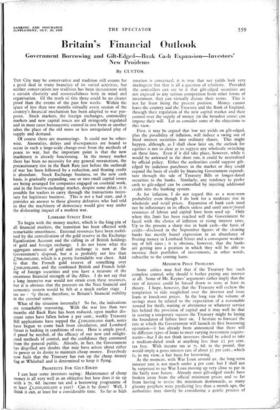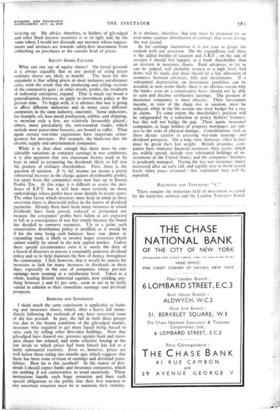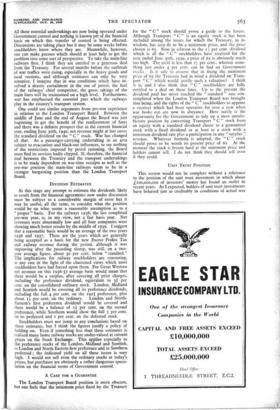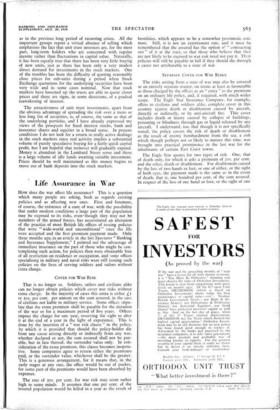Britain's Financial Outlook
Government Borrowing and Gilt-Edged—Bank Cash Expansion—Investors' New Problems
By CUSTOS THE City may be conservative and tradition still counts for a good deal in many branches of its varied activities, but neither conservatism nor tradition has been inconsistent with a certain elasticity and resourcefulness both in mind and organisation. Of the truth of this there could be no clearer proof than the events of the past few weeks. Within the space of less than two months virtually every section of the country's financial mechanism has been adapted to war pur- poses. Stock markets, the foreign exchanges, commodity markets and new capital issues are all stringently regulated and in most cases bureaucratic control in one form or another takes the place of the old more or less unregulated play of supply and demand.
Of course there are murmurings. It could not be other- wise. Anomalies, delays and discrepancies are bonnd to occur in such a large-scale change-over from the methods of peace to war, but the important point is that the new machinery is already functioning. In the money market there has been no necessity for any general moratorium, the precautionary rise in the Bank Rate just before the outbreak of war has been followed by a reduction, and floating credit is abundant. Stock Exchange business, on the new cash basis, is gradually expanding, one or two small capital issues are being arranged for companies engaged on essential work, and in the foreian-exchange market, despite some delay, it is possible for traders to carry through the transactions neces- sary for legitimate business. This is not a bad start, and it provides an answer to those gloomy defeatists who had told us that the machinery of democracy would give way under the dislocating impact of a modern war.
LOMBARD STREET EASE To begin with the money market, which is the king-pin of all financial markets, the transition has been effected with remarkable smoothness. External resources have been mobil- ised by the centralisation of the gold reserve in the Exchange Equalisation Account and the calling in of British holdings of gold and foreign exchange. I do not know what the aggregate amount of gold and exchange is now at the Government's disposal, but it is probably not less than £700,000,000, which is a pretty formidable war chest. Add to that the French gold reserve of something over ksoo,000,000, and the combined British and French hold- ing of foreign securities and you have a measure of the enormous financial strength of the Allies. I do not say that a long intensive war would not strain even these resources, but it is obvious that the pressure on the Nazi financial and economic system would be felt at a much earlier stage. I see no C ly threat, therefore, to Britain's financial stability in the external sense.
What of the situation internally? So far, the indications are remarkably reassuring. With the war less than two months old Bank Rate has been reduced, open market dis- count rates have fallen below 2 per cent., weekly Treasury Bill applications have topped the £ oo,000,000 mark, notes have begun to come back from circulation, and Lombard Street is basking in conditions of ease. Here is ample proof, if proof be needed, of the efficacy of our new and enlight- ened methods of control, and the confidence they command from the general public. Already, in fact, the Government has dispelled any doubts that may have arisen about either its power or its desire to maintain cheap money. Everybody now feels that the Treasury has run up the cheap money flag at Whitehall and is determined to keep it flying.
PROSPECTS FOR GILT-EDGED I can hear some investors saying: Maintenance of cheap money is all very well as an objective but how does it tie up with a 75. 6d. income tax and a borrowing programme of at least Li,000,000,000 a year? Can it be done? Well, I think it can, at least for a considerable time. So far as high taxation is concerned, it is true that net yields look very inadequate but that is all a question of relativity. Provided the controllers can see to it that gilt-edged securities are not exposed to any serious competition from other forms of investment, they can virtually dictate their terms. This is not far from being the present position. Money cannot leave the country and the Treasury and the Bank of England, through their regulation of the new capital market and their control over the supply of money (in the broadest sense) can impose their will. Let us consider some of the objections to this view.
First, it may be argued that low net yields on gilt-edged, plus the possibility of inflation, will induce a swing out of fixed interest securities into ordinary shares. This might happen, although, as I shall show later on, the outlook for equities is not so clear as to suggest any wholesale switching on these lines. Even if it did take place, however, while it would be awkward in the short run, it could be neutralised by official policy. Either the authorities could support gilt- edged by judicious purchases in the market or they could expand the basis of credit by financing Government expendi- ture through the sale of Treasury Bills or longer-dated securities to the banks. Similarly, any tendency to prefer cash to gilt-edged can be controlled by injecting additional credit into the banking system.
As for inflation, I do not regard this as a near-term probability even though I do look for a moderate rise in wholesale and retail prices. Expansion of bank cash need not be inflationary in its effects unless and until unetr2loyed resources of labour and capital have been used up. Only when this limit has been reached will the Government be faced with the choice of inflation or rising interest rates. Up to the present a sharp rise in bank cash—the basis of credit—disclosed in the September figures of the clearing banks has merely found expression in an abundance of floating money in Lombard Street and a consequent weaken- ing of bill rates ; it is obvious, however, that the banks are getting into a position in which they will be able to increase their portfolios of investments, in other words, subscribe to the coming loans.
MINIMUM PRICE PROBLEMS Some critics may feel that if the Treasury has such complete control, why should it bother paying any interest at all. Some of Mr. Keynes' arguments rather imply that the rate of interest could be forced down to zero, at least in theory. I hope, however, that the Treasury will eschew the temptation to ride roughshod over the investor and issue loans at knock-out prices. In the long run the volume of savings must be related to the expectation of a reasonable reward for thrift, waiting or abstinence or whatever service lies behind the provision of capital and it may well be that in scoring a temporary success the Treasury might be laying the foundaton of failure later on. I hesitate to forecast the rate at which the Government will launch its first borrowing operation—it has already been announced that there will be different types of loans to meet varying investment require- ments—but I do not think investors should be asked to take a medium-dated stock at anything less than 2i per cent. tax free. With income tax at 7s. 6d. in the pound, that would imply a gross interest rate of about 3i per cent., which is, in my view, a fair basis for borrowing. At the moment, with War Loan around 91, the long-term interest rate is not much under 4 per cent. but I shall not be surprised to see War Loan moving up very close to par in the fairly near future. Already most gilt-edged stocks have broken away from the official minimum prices and so far from having to revise the minimum downwards, as many gloomy prophets were predicting less than a month ago, the authorities may shortly be considering a gentle process of leveling up. My advice, therefore, to holders of gilt-edged and other 'fixed interest securities is to sit tight and, by the same token, I would not dissuade any investor whose require- ments and instincts are towards safety-first investment from embarking on purchases at the current level of prices.
EQUITY SHARE FACTORS What can one say of equity shares? On broad grounds it is always arguable that in any period of rising prices ordinary shares are likely to benefit. The basis for this argument is that selling prices in most instances out-distance costs, with the result that the producing and selling sections of the community gain ; in other words, profits, the residuum of industrial enterprise, expand. That is much too broad a generalisation, however, to apply to investment policy at the present time. To begin with, it is obvious that war is going to affect different industries and in many cases different companies in the same industry, unevenly. Some industries, for example, oil, base metal production, rubber, and shipping, to mention only a few, are relatively favourably placed ; others, more particularly the non-essential trades, which include most peace-time luxuries, are bound to suffer. Then again certain war-time regulations have important conse- quences for investors. For example, the black-out hits the electric supply and entertainment companies.
While it is thus clear enough that there must be con- siderable variations in company earnings in war conditions, it is also apparent that two important factors need to be kept in mind in estimating the dividends likely to fall into the pockets of ordinary shareholders. First, there is the question of taxation. A 7s. 6d. income tax means a pretty substantial increase in the charge against distributable profits, but apart from this companies must now face up to Excess Profits Tax. At this stage it is difficult to assess the inci- dence of E.P.T. but it will bear most severely on those undertakings whose profits have risen sharply in recent years. The other factor which investors must keep in mind in these uncertain times is directorial policy in the matter of dividend payments. Already there have been many instances in which dividends have been passed, reduced or postponed not because the companies' profits have fallen or are expected to fall as a consequence of war but simply because the board has decided to conserve resources. Up to a point such conservative distribution policy is justified, as it would be if for the time being cash balances have run down or expanding trade is likely to involve larger resources which cannot readily be raised in the new capital market. Unless these special circumstances exist it is surely the duty of a board of directors to pursue a reasonably generous dividend policy and so to help maintain the flow of money throughout the community. I feel, however, that it would be unwise for investors to look for many increases in dividends in these days, especially in the case of companies whose pre-war earnings were running at a satisfactory level. Taken as a whole' leading British industrial equities, now yielding any- thing between 5 and 61 per cent., seem to me to be fairly valued in relation to their immediate earnings and dividend prospects.
BANKING AND INSURANCE I think much the same conclusion is applicable to bank- ing and insurance shares, which, after a heavy fall imme- diately following the outbreak of war, have recovered some of the lost ground. In part, the fall in both these groups was due to the frozen condition of the gilt-edged market, investors who required to get more liquid being forced to raise cash by selling other first-class holdings. Now that gilt-edged have thawed out, pressure against bank and insur- ance shares has relaxed, and some selective buying at the low levels to which prices had been forced has led to a fairly substantial recovery. Even so, however, prices are well below those ruling two months ago, which suggests that there has been some revision of earnings and dividend possi- bilities. How far is this justified? In the matter of divi- dends I should expect banks and insurance companies, which are nothing if not conservative, to tread cautiously. These institutions handle such huge resources and have such special obligations to the public that their first reaction to any uncertain situation must be to maintain their stability.
•
It is obvious, therefore, that one must be prepared for an even more cautious distribution of earnings than usual during the war period.
As for earnings themselves it is not easy to gauge the outlook with any precision. On the expenditure side there is the added burden of taxation and A.R.P. ; on the side of receipts I should feel happier as a bank shareholder than an investor in insurance shares. Bank advances, so far as can be judged, will probably remain at a high level, bad debts will be small, and there should be a fair allocation of resources between advances, bills and investments. If a substantial depreciation on investment portfolios can be avoided, as now seems likely, there is no obvious reason why the banks, even on a conservative basis, should not be able to earn and disclose satisfactory earnings. The position of insurance companies is more obscure. Their investment income, in view of the sharp rise in taxation, must be reduced, while in the life section one must budget for a rise in claims. To some extent the shareholder's position will be safeguarded by a reduction in policy holders' bonuses, but this will not bridge the gap. Then, again, insurance companies, as large holders of property mortgages, are sub- ject to the risks of physical damage. Considerations such as these dictate caution in assessing war-time earnings and dividend prospects. On a long view, however, ether factors must be given their fair weight. British insurance com- panies have immense financial resources, their assets, which are widely spread, include very substantial holdings of in- vestments in the United States, and the companies' business is prudently managed. During the last war insurance shares recovered after an early fall, and rapidly rose to fresh record levels when peace returned ; that experience may well be repeated.
RAILWAYS AND TRANSPORT " C " There remains the important field of investment occupied by the main-line railways and the London Transport Board. All these essential undertakings are now being operated under Government control and nothing is known ydt of the financial basis on which this transfer of control is being effected. Discussions are taking place but it may be some weeks before stockholders know where they are. Meanwhile, however, one can make guesses which should at least help to get the problem into some sort of perspective. To take the main-line railways first, I think they are entitled to a generous deal from the Treasury. For several months before the outbreak of war traffics were rising, especially in the heavy goods and local sections, and although estimates can only be very tentative, I imagine that in war conditions which have in- volved a drastic curtailment in the use of petrol, the fuel of the railways' chief competitor, the gross takings of the main lines will be maintained on a high level. Furthermore, war has emphasised the essential part which the railways play in the country's transport system.
One could use similar arguments from pre-war experience in relation to the London Transport Board. Between the middle of June and the end of August the Board was just beginning to get the benefit of the readjustment of fares and there was a definite prospect that in the current financial year, ending June 3oth, 1940, net revenue might at last cover the standard dividend on the " C " stock. War has changed all that. As a passenger-carrying undertaking in an area subject to evacuation and black-out influences, to say nothing of the restrictions imposed by petrol rationing, the Board must find its services badly clipped. If, therefore, the financial deal between the Treasury and the transport undertakings is to be made dependent on war-time receipts as well as the pre-war position the main-line railways seem to be in a stronger bargaining position than the London Transport Board.
DIVIDEND ESTIMATES
At this stage any attempt to estimate the dividends likely to result from the financial agreements now under discussion must be subject to a considerable margin of error but it may be useful, all the same, to consider what the position would be on what seems a reasonable assumption as to a " proper " basis. For the railways 1938, the last completed pre-war year, is, in my view, not a fair basis year. Net revenues were abnormally low and all four companies were showing much better results by the middle of 1939. I suggest that a reasonable basis would be an average of the two years 1936 and 1937. These are the years which are generally being accepted as a basis for the new Excess Profits Tax and railway revenue during the period, although it was improving after the preceding slump, was still, on a two- year average figure, about 30 per cent. below " standard " The implications for railway stockholders are reassuring, at any rate in the light of the chastened views which most stockholders have had forced upon them. For Great Western net revenue on this 1936-37 average basis would mean that there would be a surplus, after covering all prior charges, including the preference dividend, equivalent to 31 per cent. on the consolidated ordinary stock. London, Midland and Scottish would be covering all its preference dividends, including the full 4 per cent. on the 192g preference, plus about ri per cent. on the ordinary London and North- Eastern's first preference dividend would be covered and there would be a balance of if per cent. on the second preference, while Southern would show the full 5 per cent. on its preferred and i per cent. on the deferred stock.
Stockholders must not jump to any conclusions based on these estimates, but I think the figures justify a policy of holding on. Even if something less than these estimates is realised many home railway stocks are under-valued at current prices on the Stock Exchange. This applies especially to the preference stocks of the London, Midland and Scottish, to London and North Eastern first preference and to Southern preferred ; the indicated yield on all these issues is very high. I would not sell even the ordinary stocks at today's prices, but purchases are obviously a rather dangerous specu- lation on the financial terms of Government control.
A CASE FOR A GUARANTEE
The London Transport Board position is more obscure, but one feels that the minimum price fixed by the Treasury for the " C " stock should prove a guide to the future. Although Transport " C " is an equity stock it has been included among the issues for which the Treasury, in its wisdom, has seen fit to fix a minimum price, and the price chosen is 65. Now in relation to the II, per cent. dividend which is all the " C " stockholders have received for the year ended June 3oth, 1939, a price of 65 is obviously much too high. The yield is less than 21 per cent., whereas some- thing just under 4 per cent. can be had on Government stocks. Is it safe to assume that in fixing the minimum price of 65 the Treasury had in mind a dividend on Trans- port " C " which would justify such a valuation? I think it is, and I also think that "C" stockholders are fully entitled to a deal on these lines. Up to the present the dividend paid has never reached the " standard " rate con- templated when the London Transport Board was brought into being, and the rights of the " C" stockholders to appoint a receiver which had been operative for over a year when war broke out are now in abeyance. Here surely is the opportunity for the Government to tidy up a most unsatis- factory position by converting Transport "C" stock from an equity with a standard dividend clause to a guaranteed stock with a fixed dividend or at least to a stock with a minimum dividend rate plus a participation in any " surplus " revenue. Whatever formula is adopted, the " C " stock should prove to be worth its present price of 65. At the moment the stock is frozen hard at the minimum price and holders cannot sell. I do not think they should sell even if they could.
UNIT TRUST POSITION
This review would not be complete without a reference to the position of the unit trust movement in which about kroo,000,000 of investors' money has found an outlet in recent years. As I expected, holders of unit trust investments have behaved just as creditably in conditions of actual war as in the previous long period of recurring crises. All the important groups report a virtual absence of selling which emphasises the fact that unit trust investors are, for the most part, long-term holders who are concerned with regular income rather than fluctuations in capital value. Naturally, it has been equally true that there has been very little buying of new units, just as there has been only a very modest direct demand for investments in the stock markets. One of the troubles has been the difficulty of quoting reasonably close prices for sub-units during a period when Stock Exchange quotations for the underlying securities have been very wide and in some cases nominal. Now that stock markets have loosened up the trusts are able to quote closer prices and there are signs, in some directions, of a gradual reawakening of interest.
The attractiveness of unit trust investments, apart from the obvious advantage of spreading the risk over a more or less long list of securities, is, of course, the same as that of the underlying portfolio, and I have already expressed my views of the prospects for fixed interest stocks, bank and insurance shares and equities in a broad sense. In present conditions I do not look for a return to really active dealings in the stock markets since real activity implies a substantial volume of purely speculative buying for a fairly quick capital profit, but I am hopeful that turnover will gradually expand. Money is abundant in the Lombard Street sense and there is a large volume of idle funds awaiting suitable investment. Prices should be well maintained as this money begins to move out of bank deposits into the stock markets.















































 Previous page
Previous page